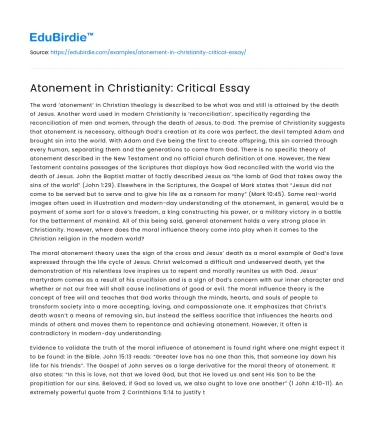The word ‘atonement’ in Christian theology is described to be what was and still is attained by the death of Jesus. Another word used in modern Christianity is ‘reconciliation’, specifically regarding the reconciliation of men and women, through the death of Jesus, to God. The premise of Christianity suggests that atonement is necessary, although God’s creation at its core was perfect, the devil tempted Adam and brought sin into the world. With Adam and Eve being the first to create offspring, this sin carried through every human, separating them and the generations to come from God. There is no specific theory of atonement described in the New Testament and no official church definition of one. However, the New Testament contains passages of the Scriptures that displays how God reconciled with the world via the death of Jesus. John the Baptist matter of factly described Jesus as “the lamb of God that takes away the sins of the world” (John 1:29). Elsewhere in the Scriptures, the Gospel of Mark states that “Jesus did not come to be served but to serve and to give his life as a ransom for many” (Mark 10:45). Some real-world images often used in illustration and modern-day understanding of the atonement, in general, would be a payment of some sort for a slave’s freedom, a king constructing his power, or a military victory in a battle for the betterment of mankind. All of this being said, general atonement holds a very strong place in Christianity. However, where does the moral influence theory come into play when it comes to the Christian religion in the modern world?
The moral atonement theory uses the sign of the cross and Jesus’ death as a moral example of God’s love expressed through the life cycle of Jesus. Christ welcomed a difficult and undeserved death, yet the demonstration of His relentless love inspires us to repent and morally reunites us with God. Jesus’ martyrdom comes as a result of his crucifixion and is a sign of God’s concern with our inner character and whether or not our free will shall cause inclinations of good or evil. The moral influence theory is the concept of free will and teaches that God works through the minds, hearts, and souls of people to transform society into a more accepting, loving, and compassionate one. It emphasizes that Christ’s death wasn’t a means of removing sin, but instead the selfless sacrifice that influences the hearts and minds of others and moves them to repentance and achieving atonement. However, it often is contradictory in modern-day understanding.
Save your time!
We can take care of your essay
- Proper editing and formatting
- Free revision, title page, and bibliography
- Flexible prices and money-back guarantee
Evidence to validate the truth of the moral influence of atonement is found right where one might expect it to be found: in the Bible. John 15:13 reads: “Greater love has no one than this, that someone lay down his life for his friends”. The Gospel of John serves as a large derivative for the moral theory of atonement. It also states: “In this is love, not that we loved God, but that He loved us and sent His Son to be the propitiation for our sins. Beloved, if God so loved us, we also ought to love one another” (1 John 4:10-11). An extremely powerful quote from 2 Corinthians 5:14 to justify this atonement states the following: “For the love of Christ controls us, because we have concluded this: that one has died for all, therefore all have died”. This powerfully backs up Jesus sacrificing his life due to the power of love for his people. However, the moral influence theory also negates the idea of original sin. It violates the Scriptures which says that no one seeks God and the unbeliever cannot comprehend or receive such things (Romans 3:10-12/1 Cor. 2:14) and that people who don’t believe are forever slaves to sin (Romans 6:14-10). On the other hand, the lavish, and sometimes viewed as reckless, demonstration of love God showed by his crucifixion of Christ while we were still sinners proves this theory to be prevalent in the Scriptures without outwardly stating, “this is the moral influence theory” (Romans 5:8).
The moral influence theory can be seen sometimes as a ‘warmed over’ version of an argument amongst Christianity as salvation through faith and grace versus through works. Most sectors of Christianity believe that belief in divinity and faith must come first, and then comes to the works through faith. Overall, the moral influence theory is about human emotions more so than spiritual connection. It states that the death of divinity, in this case, Jesus, will almost ‘guilt’ and or influence humankind for the betterment of society and themselves. However, the moral influence theory fails to acknowledge Jesus in his full divinity. Jesus was sent to reconcile people to God and atone for sin and remove guilt, yet some scholars and everyday Christians view this theory as having a ‘guilt factor’.






 Stuck on your essay?
Stuck on your essay?

